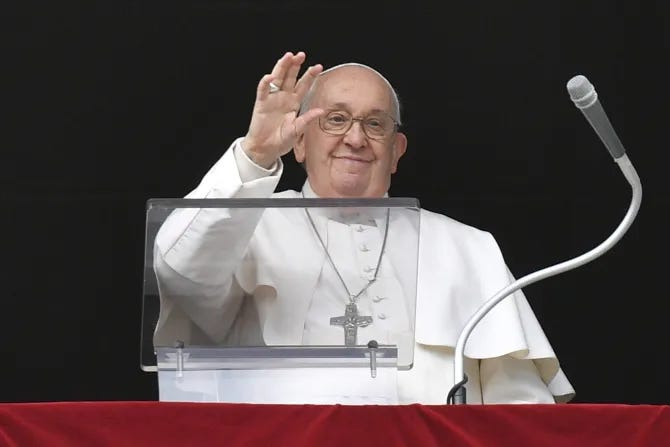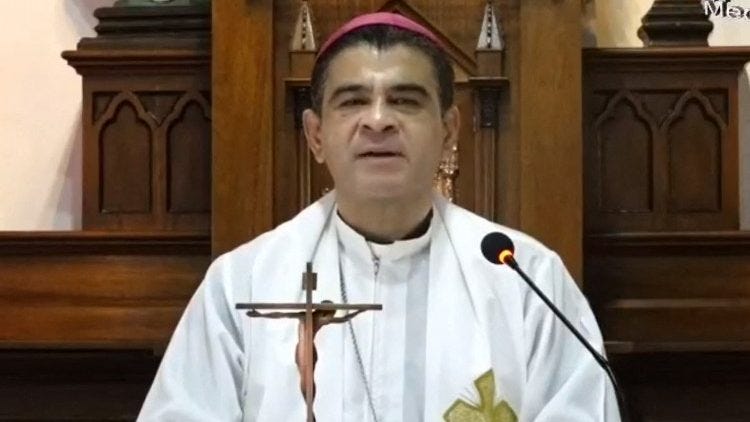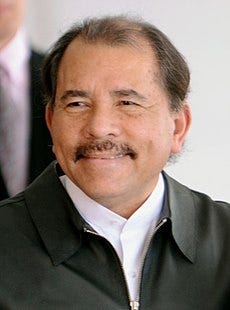Pope Francis Condemns Ortega's Crackdown Targeting Catholic Church In Nicaragua
Pontiff Expresses 'Deep Concern' Over Arrests of Bishop, Priests

By Gary Gately
Pope Francis denounced Nicaraguan President Daniel Ortega’s widening crackdown on the Catholic Church as the dictator detains bishops and priests, shuts down Catholic media and religious orders and accuses clergy of attempting to orchestrate a coup.
“I am following with deep concern what is happening in Nicaragua, where bishops and priests have been deprived of their freedom,” Francis told about 35,000 of the faithful gathered in St. Peter’s Square Monday. “I express to them, their families and the entire Church in the country my closeness in prayer.
“I also invite all of you present here and all the people of God to insistent prayer, while I hope that we will always seek the path of dialogue to overcome difficulties. Let's pray for Nicaragua today.”
The 87-year-old Jesuit pontiff’s criticism of the Ortega regime came as Vatican News reported on Monday that at least 14 priests, two seminarians and a bishop had been arrested in recent days in the Central American country.
Meanwhile, a coalition of dozen organizations composed of exiled Nicaraguans called for the international community to “remove all economic and political support” to Nicaragua.
And on Friday, Auxiliary Bishop Silvio José Báez of Managua, Nicaragua’s capital, took to X (formerly Twitter) to implore the world’s bishops to stand with the nation’s Catholic Church.
Báez, now exiled in Miami, wrote: "The Sandinista dictatorship this week unleashed a ferocious manhunt targeting priests, imprisoning many of them, in addition to two bishops already imprisoned. I beg bishops and the world's bishops' conferences not to abandon us at this time; may they pray for the church of Nicaragua, stand in solidarity, and raise their voices to denounce this persecution by the dictatorship against our Church!"
Local media reported that Bishop Isidro Mora, who leads a diocese in northern Nicaragua, was arrested December 20 for publicly praying for his colleague, Bishop Rolando Alvarez, who was arrested in 2022.
Alvarez was convicted last February of treason and sentenced to 26 years in prison, straining relations between the Vatican and the Ortega regime. The outspoken critic of the government had refused to leave the nation and follow more than 220 other Catholic clergy members into exile in the U.S.
After Alvarez’s imprisonment, Pope Francis said: “The news from Nicaragua has grieved me a great deal, and I cannot but remember with concern Bishop Rolando Alvarez of Matagalpa, whom I love so much.
“We also ask the Lord, through the intercession of the Immaculate Virgin Mary, to open the hearts of political leaders and all citizens to the sincere search for peace, which is born of truth, justice, freedom, and love and is achieved through the patient exercise of dialogue.”
The Catholic Church had long escaped being targeted by Ortega, 78, who has sought during much of his 15-year tenure to purge dissidents in politics, the media, academe, business and culture.
Then, in 2018, tens of thousands of people took to the streets to protest the Ortega regime, and the government imprisoned hundreds of dissidents, and at least 300 were shot in protests.
“I am following with deep concern what is happening in Nicaragua, where bishops and priests have been deprived of their freedom. I express to them, their families, and the entire Church in the country my closeness in prayer.” — Pope Francis
The dictatorship tossed out presidential term limits and seized control of all branches of the state.
Catholic leaders spoke out against the regime of Ortega, who responded by mounting among the most brutal crackdowns in decades on the Catholic Church in Central America. It has resulted in dozens of clerics and missionaries being detained or expelled and numerous Catholic institutions shuttered.
The Church in Nicaragua has been the target of more than 770 attacks and harassment since 2018, including hate messages and disruptions to Masses, funeral processions and public prayers, according to a study by Nicaraguan attorney Martha Patricia Molina, Nicaragua: A Persecuted Church.
Relations between the Vatican and the Ortega regime have deteriorated since, and the Vatican shut down its embassy in March. That came after the government proposed suspending relations with the Vatican.
“It is something out of line with reality,” Pope Francis said after the embassy’s shutdown. “It is as if we were bringing back the communist dictatorship of 1917 or the Hitler dictatorship of 1935.
“With much respect, I have no choice but to think that the person who leads [Ortega] is unstable.”
Ortega had helped lead a revolution that toppled a U.S.-backed, right-wing regime in 1979, then lost in 1990 elections but regained the presidency in 2007 and has sought to tear down the fabric of the country’s democracy in recent years.
It got personal for Pope Francis, the first Jesuit pontiff, when Ortega declared the Jesuits illegal last year and seized all the order’s assets. A week earlier, the Sandinista regime closed the highly regarded, Jesuit-run University of Central America in Managua.
Ortega’s government accused the 63-year-old university of being a “center of terrorism” and “betraying the trust of the Nicaraguan people.”
The Society of Jesus, the formal name of the Jesuit order, said in a statement at the time that it was “alarmed and troubled by the unjust confiscation of the University of Central America in Managua by the government of Nicaragua.”
“The seizure of the university is a blatant violation of academic and religious freedom,” the statement continued. “We pray that truth, justice, dialogue and freedom will prevail.”
Ortega also has targeted the Franscicans, shutting down the Catholic order’s office in Nicaragua; closed Catholic radio and TV stations; and forced out the Catholic organization Missionaries of Charity.
“We are deeply concerned about the systematic patterns of harassment against members of the Catholic Church and other religious denominations by Nicaraguan authorities.” — UN Office of the High Commissioner for Human Rights
The Vatican has repeatedly attempted to mediate between the Ortega regime and political dissidents, but the efforts have failed, and the government has grown increasingly hostile to the Catholic Church.
In October, Nicaragua’s government released a dozen clerics who had been detained, according to the Vatican, which said they would be housed in the Diocese of Rome.
A few weeks later, the United Nations Office of the High Commissioner for Human Rights demanded the immediate release of Bishop Alvarez and condemned the persecution of Catholics in Nicaragua.
“We are deeply concerned about the systematic patterns of harassment against members of the Catholic Church and other religious denominations by Nicaraguan authorities,” the UN organization said in a statement. “The government must immediately and unconditionally release Monsignor Alvarez and protect the right to freedom of religion or belief in the country.”
Senator Marco Rubio, R-Florida, also urged Pope Francis to call for Nicaraguan authorities to release the 57-year-old Alvarez.
“I humbly ask that you intercede for the release of Bishop Alvarez and the right to worship for all Catholics in Nicaragua,” Rubio wrote in a letter to the pontiff. “I endeavor to follow your counsel to take refuge in the word of God and pray for those in Nicaragua who are persecuted for their faith.”
Rubio, a Catholic son of Cuban immigrants whose family fled the Communist takeover of the country, said in his letter that Alvarez “has been a loyal shepherd of the Catholic faith and the essential dignity of all human life in Nicaragua.”
The senator praised Alvarez for refusing to leave Nicaragua and seek asylum in the U.S.
“It is a testament to the courage of Catholics everywhere that Bishop Alvarez refused this offer in order to continue to courageously stand with those in Nicaragua that remain unjustly detained,” Rubio wrote.




